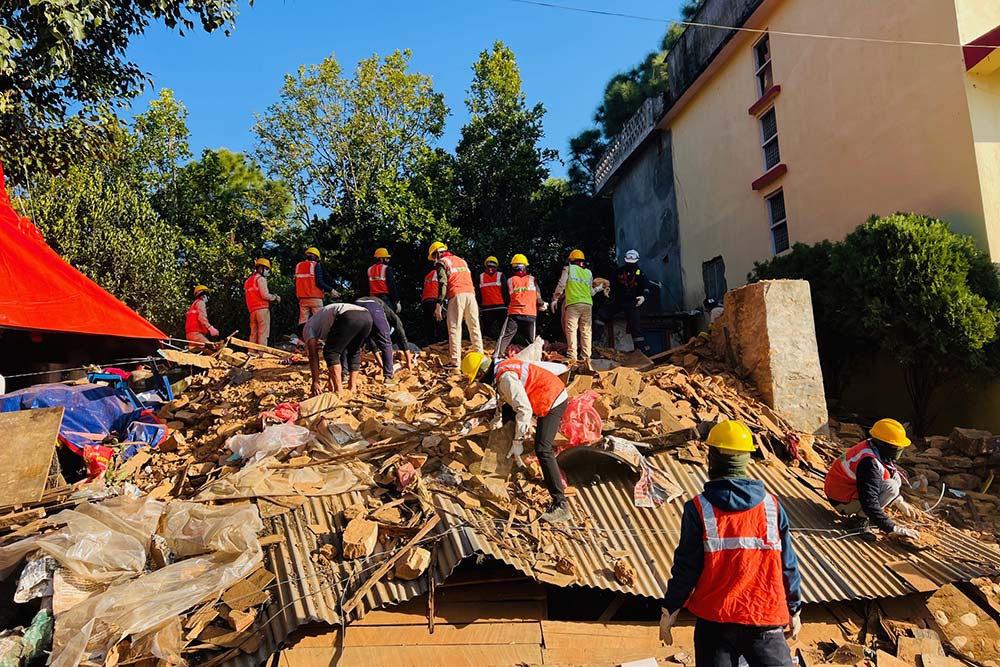
By Rebati Adhikari
Nepal has endless possibilities for investment and young people with innovative ideas are set to create businesses that add value to the lives of other people. Almost every sector is witnessing innovative enterprises and the health sector is no exception. Four startups have secured their place on our list because of their avant-garde services:Online Aushadhi
While buying most of your essentials online, have you ever wished that medicines were available online? Online Aushadhi is an online pharmacy, a pioneer in the field. Simply place an order and you will have your medicine delivered right at your doorstep within 24 hours. Call the customer support team or register on the official website to request an order. A doctor’s prescription is mandatory if it is not over-the-counter medicine. Founder Sanjeev Singh shares, “the major objective is to give hassle-free medicine purchase experience. It’s a new concept so we are very hopeful that we will go a long way.” Established towards the end of 2015, it currently delivers medicines within Ring Road. “We receive about 5-6 orders per day. The response so far has been positive,” Singh states. “We are planning to expand our service outside the valley and for that we are studying the protocols.”
Founder Sanjeev Singh shares, “the major objective is to give hassle-free medicine purchase experience. It’s a new concept so we are very hopeful that we will go a long way.” Established towards the end of 2015, it currently delivers medicines within Ring Road. “We receive about 5-6 orders per day. The response so far has been positive,” Singh states. “We are planning to expand our service outside the valley and for that we are studying the protocols.”
Medsaala.com
Doctors prescribe medicines to patients; but, rarely do patients know about the function of those medicines. They hardly pose questions to their doctors about matters pertaining to their health, least of all medicines. Medsaala.com is an online portal developed to facilitate medicine search experience of users and help them figure out what kind of disease are they using the medicine for. The website was launched in February. Santosh Tiwari, founder of Medsaala.com also a health professional states, “So far we have not come across an online portal of this kind and we are still studying the feasibility, and gradually upgrading our services. We are also thinking of adding an online pharmacy service.” Except for medicines manufactured in India, it is onerous to get information about those produced even in South Asia region. “We want to make medicine information hunt easier,” says Tiwari.
Medsaala.com is an online portal developed to facilitate medicine search experience of users and help them figure out what kind of disease are they using the medicine for. The website was launched in February. Santosh Tiwari, founder of Medsaala.com also a health professional states, “So far we have not come across an online portal of this kind and we are still studying the feasibility, and gradually upgrading our services. We are also thinking of adding an online pharmacy service.” Except for medicines manufactured in India, it is onerous to get information about those produced even in South Asia region. “We want to make medicine information hunt easier,” says Tiwari.
Hamro Doctor
Hamro Doctor is a health news portal which provides comprehensive information on disease, process of diagnosis, hospitals, doctors and other health issues. The website and mobile app were jointly launched in 2015 by a three-member team of Uddhav Raj Bhetuwal, Madhusudan Dhakal and Ashok Raj Pandey. Hamro Doctor provides database on hospitals and doctors. So far, it has collected data of 3500 doctors, 172 hospitals and 134 clinics. After collecting information on doctors and health institutions, Hamro Doctor verifies the gathered information with Nepal Medical Council (NMC) and the district health office. “We don’t want people to go to fake hospitals after reading news available on our site; thus, everything is cross-checked,’ says Bhetuwal, Chief Editor of Hamro Doctor.
It has the updated data base on hospitals of Kathmandu, Bhaktapur and Lalitpur districts and is in the process of database expansion of all 75 districts. The expansion process, at present, is facing setbacks due to limited research and insufficient funds.
Compared to the website, mobile app of Hamro Doctor is more advanced, making the search for doctors easier. For the comfort of users, the co-founders are planning to design a separate website for news, doctors and hospital database. Along with that, online counseling and online doctor payment will also be added in their list of services.
Hamro Doctor provides database on hospitals and doctors. So far, it has collected data of 3500 doctors, 172 hospitals and 134 clinics. After collecting information on doctors and health institutions, Hamro Doctor verifies the gathered information with Nepal Medical Council (NMC) and the district health office. “We don’t want people to go to fake hospitals after reading news available on our site; thus, everything is cross-checked,’ says Bhetuwal, Chief Editor of Hamro Doctor.
It has the updated data base on hospitals of Kathmandu, Bhaktapur and Lalitpur districts and is in the process of database expansion of all 75 districts. The expansion process, at present, is facing setbacks due to limited research and insufficient funds.
Compared to the website, mobile app of Hamro Doctor is more advanced, making the search for doctors easier. For the comfort of users, the co-founders are planning to design a separate website for news, doctors and hospital database. Along with that, online counseling and online doctor payment will also be added in their list of services.
Lunivacare
Founded by Nuhundra Shakya and Rajiv Shrestha Lunivacare is a lunivatech’s subsidiary, which is transforming health care system through digital technology. In Nepal, medical records are largely neglected. Neither the hospital nor the patients themselves have a good system of documentation. Some hospitals may have their own way of storing patient medical data, but digital medical record is largely non-existent. “By habit we don’t give serious consideration to medical record, it is all scattered, some papers are owned by hospitals while some are with us, and we don’t have good insurance policy either. In due time, we lose those papers. It may seem like a petty matter; but it makes a huge difference in diagnosis,” states Shakya, “If we have our medical record secured, treatment becomes easy.” The initial idea was to start collecting data with hospitals; but they had to restrict digitisation of medical record process to clinics and labs as hospitals cover a wide area. In the past two years, Lunivacare has stored data of more than two lakh patients. Initially, they themselves approached hospitals asking for medical data. But in case of Nepal Police Hospital, they approached Lunivacare after Luniva digitised information of National Reference Laboratory. At present, one hospital, six labs and two clinics are using Luniva’s software.
They have made their software available for clinics and laboratories only. In regards to public use, only prototype version has been prepared. From the next fiscal year, it will be available for individual use as well. The price of the software differs in terms of features available.
Like many startups they had different expectation but reality turned out to be otherwise. “We had thought we would only analyse data but we didn’t obtain any data at all. Collecting medical data from different hospitals, we aim to make medical data cards. When you are hospitalised anytime in the future, the card will help the doctor to scan the patient’s medical history. It gives basic outline on the condition of patient and what kind of diagnosis is necessary,” shares Shakya. He further states, “Our emphasis is to make people aware of the significance of medical data.”
The initial idea was to start collecting data with hospitals; but they had to restrict digitisation of medical record process to clinics and labs as hospitals cover a wide area. In the past two years, Lunivacare has stored data of more than two lakh patients. Initially, they themselves approached hospitals asking for medical data. But in case of Nepal Police Hospital, they approached Lunivacare after Luniva digitised information of National Reference Laboratory. At present, one hospital, six labs and two clinics are using Luniva’s software.
They have made their software available for clinics and laboratories only. In regards to public use, only prototype version has been prepared. From the next fiscal year, it will be available for individual use as well. The price of the software differs in terms of features available.
Like many startups they had different expectation but reality turned out to be otherwise. “We had thought we would only analyse data but we didn’t obtain any data at all. Collecting medical data from different hospitals, we aim to make medical data cards. When you are hospitalised anytime in the future, the card will help the doctor to scan the patient’s medical history. It gives basic outline on the condition of patient and what kind of diagnosis is necessary,” shares Shakya. He further states, “Our emphasis is to make people aware of the significance of medical data.”
Published Date: August 10, 2017, 12:00 am
Post Comment
E-Magazine
RELATED Feature





